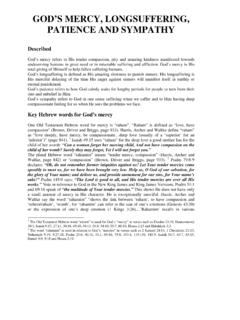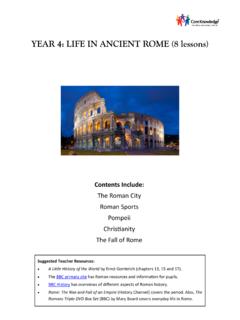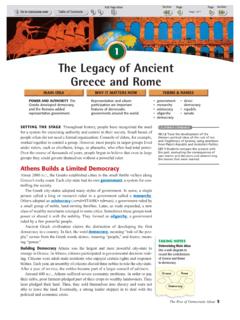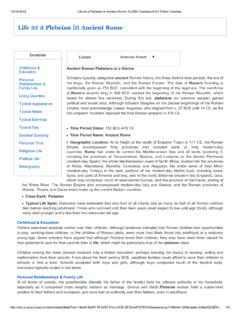Transcription of Killing new-borns in ancient greece and rome
1 Killing Newborns In ancient greece And Rome They try to justify murder Proverbs 14:12 and 16:25 warn us: There is a way that seems right to a man, but its end is the way of death. In his life of Lycurgus , the Greek historian Plutarch (48-122 ) records that in Sparta in ancient greece , the Spartan elders examined all newborn babies and ordered that any who were not well-built and sturdy were to be killed by leaving them in the bush at the foot of Mount Taygetus: 1 Offspring was not reared at the will of the father, but was taken and carried by him to a place called Lesche, where the elders of the tribes officially examined the infant, and if it was well-built and sturdy, they ordered the father to rear it, and assigned it one of the nine thousand lots of land.
2 But if it was ill-born and deformed, they sent it to the so-called Apothetae, a chasm-like place at the foot of Mount Taygetus, in the conviction that the life of that which nature had not well equipped at the very beginning for health and strength, was of no advantage either to itself or the state. Such new-borns starved or froze to death or were eaten by wild animals. 2 Note that Plutarch said that the elders of the Spartan tribes had the right to decide which baby lived and which was killed. Also Plutarch records that Lycurgus adopted the philosophy that any baby which was not very healthy and strong was no advantage to itself or to the state.
3 This is the same type of utilitarian and ends-justifies-the-means reasoning which Adolf Hitler and his Nazi criminals used in Germany in the late 1930 s and early 1940 s in relation to murdering newborn children with deformities. The Greek historian Herodotus (approximately 484-424 ) records that the King of Medes ordered a newborn baby be killed: The herdsmen made haste to answer the summons, and Harpagus said to him: The king s orders are that you must expose this infant in the wildest spot you know of amongst the hills, where it may soonest die.
4 3 Here we see that the Medes practice of murdering newborn babies involved similar methods to that used by the pagan Greeks and Romans abandoning the babies on hills or mountains. The Medes and Persians had a powerful empire and conquered Babylon in the time of the prophet Daniel (see Daniel 5:28, 5:31-6:9 and 8:20). The Book of Esther refers to the Medes and Persians also. ancient Greeks finding excuses to murder newborn babies In his writing Theaetetus , the Greek philosopher Plato quoted Socrates saying that children with any defects should be killed: For we must take care that we don t overlook some defect in this thing that is entering into life ; it may be something not worth bringing up, a wind-egg, a falsehood.
5 What do you say? Is it your opinion that your child ought in any case to be brought up and not 1 Plutarch, life of Lycurgus , 16. 2 Ibid. 3 Herodotus, The Histories , Book 1, 110. exposed to die? Can you bear to see it found fault with and not get into a rage if your first-born is stolen away from you? 4 Socrates argues here that we should murder newborn babies with any physical defects so they can avoid other people finding fault with them. In his play Ion , the ancient Greek dramatist Euripides (485-406 ) had his main female character named Kreusa (Kre) discuss with her female slave known as Old Servant ( ) the fact that Kreusa exposed her unwanted baby to death.
6 Kreusa was Queen of Athens and the wife of Xuthus, the king-consort of Athens. Euripides words illustrate another excuse ancient Greeks used to murder their unwanted new-borns : And how didst thou conceal Apollo s rape? Kre. I travailed bear to hear my tale, old friend! Who tended thee?..alone in trial s hour! Kre. Alone within the cave that saw my rape. And the boy, where? that thou no more be childless. Kre. Dead is he, ancient unto beasts cast out. Dead? and Apollo, traitor! helped thee nought? Kre. Helped not. The child is nursed in Hades halls. Who cast him forth? Not thou O never thou!
7 Kre. Even I. My vesture darkling swaddled him. Nor any knew the exposing of the child? Kre. None Misery and Secrecy alone. How couldst thou leave thy babe within the cave? Kre. Ah how? O pitiful farewells I moaned! Poor heart of steel! O God s heart harder yet! Kre. Ah, hadst thou seen the babe s hands stretched to me! Seeking the breast, or cradle of thine arms? Kre. Where he lay not, and so had wrong of me. And in what hope didst thou cast forth the babe? Kre. That the God yet would save him his own child. Note that Kreusa tried to justify her wicked murder by saying she hoped God would save the child from death.
8 She called the child his own child , meaning God owned the child and therefore was primarily responsible if it lived or died. But she ignored the fact that God had put the child in her delegated care and she was therefore guilty of murder if the child died as a result of its exposure in the bush. In his play The Arbitration , the Greek dramatist Menander (343-293 ) had one of his main characters, the slave Onesimos say the following about Onesimos master raping a girl: He lost this ring last year at the Tauropolia An all-night song-and-dance for women. It s pretty clear what happened was, a girl got raped, and had this child; and then, of course, exposed it.
9 5 Note Onesimos said that ..a girl got raped, and had this child; and then, of course, exposed it. By using the words of course , he was saying that it was normal in Athens and/or greece at that time to murder any newborn babies which were the result of rape. In modern times, many insist that babies produced by rape should be considered for abortion. The ancient Athenians and/or Greeks in Menander s time believed that babies who were the result of rape should be left to die out in the bush. Modern supporters of abortions in rape cases and the ancient Athenians and/or Greeks probably used similar ends-justifies-the- 4 Plato, Theaetetus , 161a.
10 5 Menander, The Arbitration , 234-236. means arguments to support such killings of innocent children. They believed the philosophy that two wrongs make a right. In ancient greece , some females aborted their own unwanted babies. In his Sayings of Spartan Women , the Greek biographer Plutarch (48-122 ) wrote about a girl in ancient Sparta in greece : A girl had secret relations with a man, and, after bringing on an 6 In the 200 s , the Greek poet Posidippus wrote, Everybody raises a son even if he is poor, but exposes a daughter even if he is rich. 7 Posidippus indicates that many wealthy and poorer Greeks murdered their newborn daughters.
















